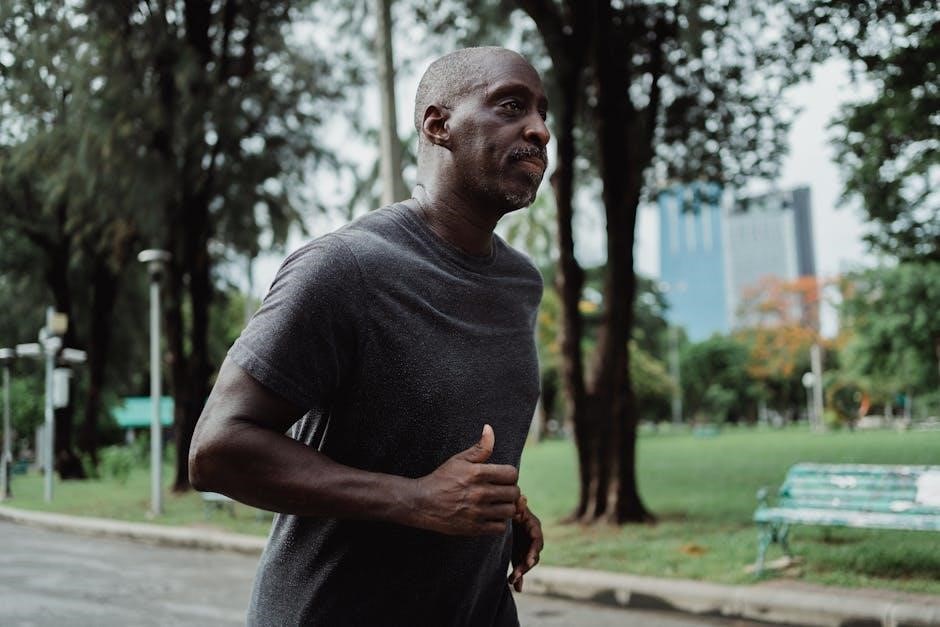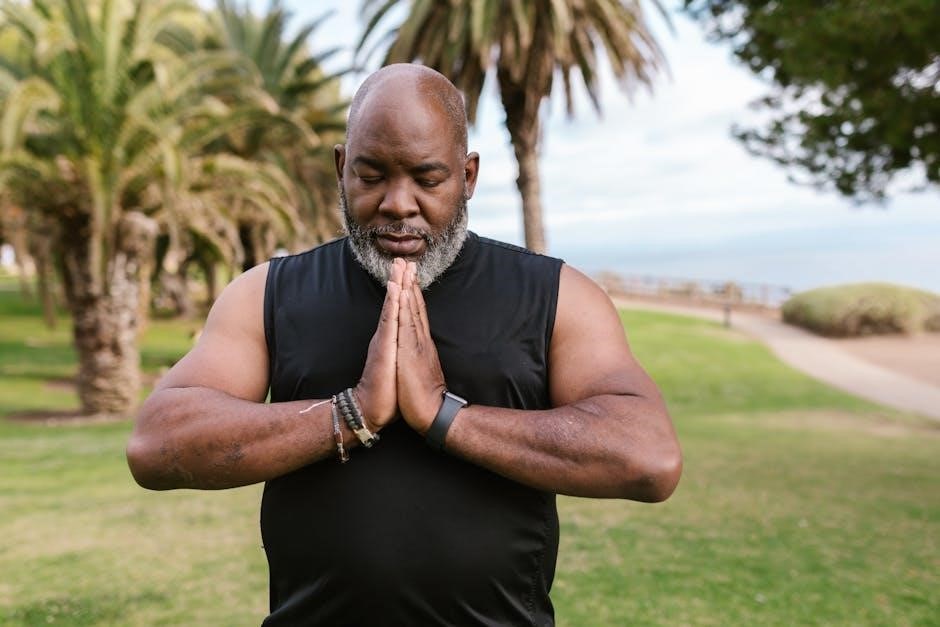Deacon training in the Black Church is vital for equipping servant leaders with biblical knowledge and practical skills to serve effectively. It emphasizes spiritual growth, community engagement, and fostering a deep understanding of the deacon’s role in the church’s mission.
Overview of the Role of Deacons in the Black Church
Deacons in the Black Church serve as servant-leaders, supporting the pastor and congregation through spiritual guidance, community outreach, and administrative support. Their role is rooted in biblical teachings, emphasizing faithfulness, humility, and a commitment to serving others. Deacons often oversee ministries such as visitation, benevolence, and fellowship, ensuring the needs of the church and community are met. They act as a bridge between the congregation and church leadership, fostering unity and discipleship. Their responsibilities include prayer, teaching, and modeling Christ-like behavior, making them integral to the church’s mission and spiritual growth.
Importance of Structured Training Programs
Structured training programs are essential for equipping deacons with the necessary skills and knowledge to fulfill their roles effectively. These programs ensure deacons are well-versed in biblical teachings, church governance, and community service. They provide a foundation for consistent leadership, helping deacons navigate challenges and adapt to modern church needs. Training fosters unity among deacons, ensuring they align with the church’s vision and values. By addressing both theological and practical aspects, structured programs empower deacons to serve with confidence and integrity, enhancing their ability to support the pastor and congregation while meeting the spiritual and social needs of the community. This investment strengthens the church’s overall ministry.

Historical Overview of Deacon Ministries in the Black Church
Deacons have historically been pivotal in the Black Church, serving as spiritual pillars and community advocates. Their role has evolved, addressing social issues and upholding traditions, ensuring their enduring impact.
The Evolution of the Deacon’s Role
The deacon’s role in the Black Church has evolved significantly over time, adapting to the changing needs of the congregation and society. Historically, deacons served as spiritual and community leaders, focusing on care for the poor and sick. In modern times, their responsibilities have expanded to include leadership development, administrative support, and addressing contemporary social issues. This shift reflects the dynamic nature of the church’s mission, ensuring deacons remain relevant and effective in their service. Training programs now emphasize both traditional and modern skills to prepare deacons for these diverse responsibilities.
Key Figures and Their Contributions
Reverend Yvonne Clarke, the first Black female deacon in the Church of England, played a pivotal role in breaking barriers for women in leadership. Ordained in 1987, her ministry emphasized community care and advocacy. Similarly, Eric A. Mayes, through his comprehensive manual on deacon training, provided structured guidance for both self-study and pastor-directed programs. These leaders have significantly shaped the role of deacons, blending traditional values with contemporary needs, ensuring the continuity of effective servant leadership in the Black Church.
The Biblical and Theological Foundations of Deacon Training
Deacon training is rooted in biblical principles, emphasizing servant leadership, humility, and faithfulness. Scriptural qualifications from 1 Timothy 3 guide the selection and preparation of deacons for ministry.
Qualifications of Deacons According to Scripture
According to Scripture, deacons must be blameless, the husband of one wife, temperate, and faithful in their dealings. They should exhibit humility, self-control, and a strong commitment to their faith.
The Role of Servant Leadership
The role of servant leadership in deacon training emphasizes serving others with humility and selflessness. Deacons are called to follow Christ’s example, prioritizing the needs of others and fostering a spirit of unity.

Deacon Training Methods in the Black Church
Deacon training in the Black Church often includes structured programs, informal mentorship, and on-the-job learning, ensuring deacons are well-equipped to serve effectively in their ministries.

Formal Training Programs
Formal training programs for deacons in the Black Church are structured to provide comprehensive biblical education and practical ministry skills. These programs often include coursework on theology, church governance, and community service. They may also incorporate workshops and seminars led by experienced church leaders. The goal is to ensure deacons are well-prepared to fulfill their roles effectively. Such programs emphasize spiritual growth, leadership development, and a deep understanding of the deacon’s responsibilities. Many churches utilize manuals and study guides, such as the Deacon Training Manual, to guide the training process. These resources help deacons apply biblical principles in real-world ministry settings.
Informal Mentorship and On-the-Job Learning
Informal mentorship and on-the-job learning are integral to deacon training in the Black Church, providing hands-on experience and practical wisdom. Experienced deacons often guide newcomers, sharing insights and modeling servant leadership. This approach allows trainees to observe and participate in ministry tasks, such as visiting the sick, managing benevolence funds, and facilitating church events. Mentors offer personalized feedback, helping deacons navigate challenges and develop confidence. Testimonies highlight the value of these informal methods, as they foster a deeper understanding of the church’s culture and needs. Such learning complements formal training, equipping deacons to serve effectively in real-world ministry contexts.

Curriculum and Content of Deacon Training
Deacon training curriculum includes theological education, biblical studies, and practical ministry skills, emphasizing servant leadership and addressing the unique needs of the church and its community effectively.
Theological Education and Biblical Studies
Theological education and biblical studies form the cornerstone of deacon training, equipping leaders with a deep understanding of scripture and Christian doctrine. This foundation enables deacons to interpret biblical principles, apply them to modern challenges, and provide spiritual guidance. Through in-depth study of both the Old and New Testaments, deacons gain insights into the historical and cultural contexts of faith. Additionally, courses on systematic theology and hermeneutics help deacons articulate the gospel effectively. This rigorous study prepares them to serve as spiritual leaders, addressing the needs of the congregation with wisdom and integrity, grounded in biblical truths.
Practical Skills for Ministry and Leadership
Practical skills are essential for effective deacon ministry, focusing on leadership, communication, and community service. Training includes conflict resolution, budget management, and public speaking, enabling deacons to address congregational needs. Workshops and hands-on activities help deacons develop these skills, ensuring they can lead with compassion and efficiency. Mentorship programs pair experienced deacons with newcomers, fostering practical wisdom and real-world application. These skills empower deacons to navigate challenges, manage church resources, and serve as role models in their communities, fulfilling their calling with integrity and effectiveness.

Challenges in Deacon Training
Challenges include cultural and generational gaps, adapting to modern church needs, and ensuring deacons balance traditional practices with contemporary demands while maintaining spiritual integrity and community relevance.
Cultural and Generational Differences
Cultural and generational differences pose significant challenges in deacon training within the Black Church. Traditional practices often clash with modern approaches, creating tension between preserving heritage and embracing innovation. Younger generations may prefer contemporary methods, while older members value longstanding customs, leading to conflicts in training styles. Additionally, the diversity within Black Churches, including varying age groups and cultural backgrounds, can result in differing expectations and communication styles. These differences sometimes hinder the cohesion and effectiveness of training programs. Addressing these challenges requires a balanced approach that respects cultural heritage while fostering adaptability to meet the evolving needs of the congregation.
Adapting to Modern Church Needs
Modern churches face evolving challenges, requiring deacons to adapt their roles to meet contemporary needs. With shifting societal dynamics, deacons must address issues like mental health, social justice, and technology integration. Training programs now incorporate these topics to ensure relevance and effectiveness. Embracing digital tools, such as online platforms for outreach and communication, has become essential. Additionally, fostering community engagement and inclusivity helps deacons connect with diverse congregations. By blending traditional values with modern approaches, deacons can effectively serve the church while remaining responsive to the changing world. This adaptability ensures their ministry remains impactful and aligned with the church’s mission in today’s society.

Case Studies and Success Stories
Effective deacon training programs have transformed church leadership, fostering empowered servants who impact communities. Success stories highlight deacons excelling in ministry, demonstrating faithfulness and servant leadership.
Effective Deacon Training Programs in Action
Successful deacon training programs in the Black Church often combine biblical education with practical application. For instance, some churches implement structured curriculums that include theological studies, leadership workshops, and community service projects. These programs ensure deacons are well-prepared to address the spiritual and social needs of their congregations. Mentorship initiatives, where experienced deacons guide newcomers, have also proven effective. Churches that prioritize continuous learning and hands-on training often see deacons who are confident, compassionate, and committed to their roles. These programs not only strengthen individual deacons but also enhance the overall ministry of the church, fostering a culture of servant leadership and accountability.
Testimonies from Deacons and Church Leaders
Deacons and church leaders often share powerful testimonies about the transformative impact of structured training programs. Many deacons express gratitude for the spiritual growth and clarity of purpose they gain through these initiatives. Church leaders highlight how well-trained deacons enhance the church’s mission and foster stronger community bonds. For example, one deacon shared, “The training deepened my understanding of servant leadership and empowered me to serve more effectively.” Another leader noted, “Our deacons are now more confident and equipped to address the needs of our congregation.” These testimonies underscore the lasting benefits of comprehensive deacon training for both individuals and the church as a whole;

Future Trends in Deacon Training
Future trends include integrating technology for online platforms and virtual training, enhancing accessibility and engagement. There is also a growing emphasis on expanding roles for women deacons.

The Role of Technology in Training
Technology is revolutionizing deacon training by providing online platforms and virtual classrooms, making learning accessible to a broader audience. Digital tools enhance engagement through interactive modules, videos, and simulations, allowing deacons to gain practical skills remotely. Additionally, technology facilitates real-time feedback and collaboration, fostering a sense of community among trainees. With the rise of managed IT services, churches can efficiently implement and manage these digital solutions. This integration ensures that deacon training remains relevant and effective in meeting modern church needs, while also preserving the rich traditions of the Black Church. Technology is thus a vital tool for equipping deacons in the 21st century.
Expanding Roles for Women Deacons
The role of women deacons in the Black Church is expanding, reflecting a growing recognition of their vital contributions to ministry. Historically, women have served in supportive capacities, but many churches now embrace their leadership in formal deacon roles. This shift aligns with biblical principles of servant leadership and equality in Christ. Women deacons are increasingly involved in teaching, pastoral care, and community outreach, bringing diverse perspectives that enrich the church’s mission. This expansion not only empowers women but also strengthens the church’s ability to serve its congregation and community. Training programs are adapting to include women, ensuring they are equipped for their ministries and fostering a more inclusive church environment.
Deacon training remains vital for empowering servant leaders to meet the evolving needs of the Black Church, ensuring a legacy of faithfulness and effective ministry.
The Ongoing Importance of Deacon Training
Deacon training is essential for fostering servant leadership and ensuring deacons remain effective in their roles. It equips them with biblical knowledge and practical skills to address modern church challenges. Continuous learning helps deacons adapt to cultural shifts and generational differences, ensuring relevance in ministry. By focusing on spiritual growth and community service, training strengthens their ability to support the congregation and fulfill their divine calling. Ultimately, ongoing training ensures deacons are well-prepared to lead and serve, maintaining the integrity and mission of the Black Church in an ever-changing world.

Call to Action for Churches and Deacons
Churches must prioritize deacon training to empower leaders for effective ministry. By investing in structured programs and resources, churches can ensure deacons are equipped to meet modern challenges. Deacons are urged to embrace lifelong learning, seeking opportunities for spiritual and practical growth. Collaboration between church leadership and deacons is vital to strengthen ministries and foster a culture of servant leadership. Together, they can create a foundation for sustainable impact, ensuring the Black Church remains a beacon of hope and service in the community. Collective effort and commitment are essential to uphold the sacred calling of deacons and the church’s mission.